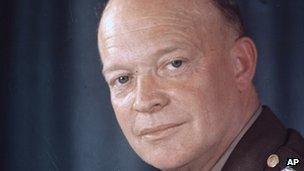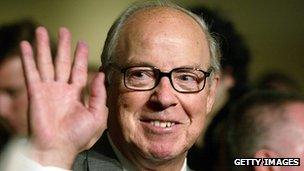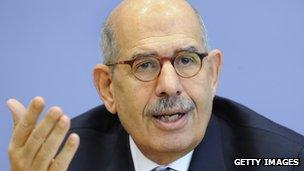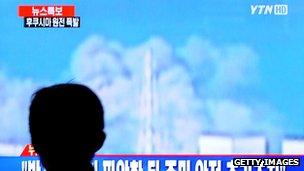Profile: IAEA, the nuclear watchdog - Timeline
- Published
A chronology of key events:
1953 - US President Eisenhower's "Atoms for Peace" speech to the United Nations. The president foresees the creation of an organisation to control and develop the use of atomic energy.
1957 - The International Atomic Energy Agency (IAEA) is set up as autonomous body under the UN.
1970 - Treaty on the Non-Proliferation of Nuclear Weapons (NPT), signed by 188 states, comes into force. The IAEA is given the specific role of defining and inspecting safeguards.
1986 - World's worst nuclear power station accident at Chernobyl, Ukraine. The IAEA investigates and reports on the immediate consequences. In the longer term IAEA teams study the effects of the disaster on the environment and health.
Iraq inspections
1991 - In the aftermath of the Gulf War, the IAEA's Iraq Action Team begins inspecting suspect sites in Iraq under the terms of a UN Security Council resolution. It aims to "uncover and dismantle Iraq's clandestine nuclear programme".
1994 - North Korea, which joined the agency in 1974, withdraws its membership after a lengthy dispute over IAEA inspections of its facilities. But it signs a pact with the US, agreeing to halt work on nuclear weapons and allowing IAEA inspections in exchange for oil aid and two light-water reactors.
1998 - Iraq Action Team withdraws from the country after the IAEA says it is unable to exercise its "right to full and free access" to Iraqi sites.
1999 - IAEA sets up its Emergency Response Centre, following a serious incident at Japan's Tokaimura facility.

US President Dwight Eisenhower's Atoms for Peace speech is said to have prompted the creation of the IAEA
2001 - IAEA assists as decommissioning of the Chernobyl nuclear power plant begins.
2002 November - IAEA's Iraq Action Team resumes work under its new name, the Iraq Nuclear Verification Office, after Iraq agrees to the unconditional return of weapons inspectors.
2002 December - North Korea expels IAEA inspectors and removes surveillance equipment from its nuclear facilities.
2003 January - North Korea pulls out of the Treaty on the Non-Proliferation of Nuclear Weapons (NPT).
Iran under scrutiny
2003 June - IAEA team arrives in Iran after reporting that Tehran has failed to meet its obligations under the NPT.

Hans Blix served as director-general between 1981 and 1997 and went on to become the UN's chief arms inspector in Iraq
2003 November - IAEA passes resolution censuring Iran for its nuclear programme, but stopping short of recommending sanctions. An earlier IAEA report said Iran had been secretly enriching uranium and producing plutonium.
2003 December - Iran signs an agreement to allow tougher inspections of its nuclear facilities.
Libya's foreign minister says the country will cooperate with the IAEA.
2004 March - IAEA adopts resolution condemning Iran for keeping some of its nuclear activities secret; the resolution stops short of threatening UN sanctions.
2004 June - IAEA report credits Iran with opening up its nuclear programme to inspections but says key issues remain unresolved.
2004 September - IAEA passes resolution calling on Iran to suspend its uranium enrichment programme. Iran rejects proposal claiming its programme is for peaceful purposes only.
2004 November - Iran agrees to suspend uranium enrichment programme in a deal with three European countries.
2005 June - IAEA board unanimously approves a third term for incumbent head Mohamed ElBaradei.
2005 August - IAEA adopts resolution urging Iran to halt work on processing uranium for enrichment. The move came after Tehran restarted uranium conversion.
2005 September - IAEA finds Iran in non-compliance with nuclear Non-Proliferation Treaty.
Nobel prize
2005 October - Nobel peace prize is awarded jointly to the IAEA and its director, Mohamed ElBaradei.
2006 February - IAEA votes to report Iran to the UN Security Council over its nuclear activities. Iran removed IAEA seals from nuclear equipment in January and said it would resume fuel research.
2006 October - IAEA says a North Korean nuclear test threatens the international treaty to prevent the proliferation of nuclear weapons.
2007 February - IAEA says Iran is continuing and expanding uranium enrichment in defiance of UN Security Council demands that it suspend these activities.
2007 March - Mohamed ElBaradei visits North Korea, saying the country is positive about rejoining the IAEA.
2007 April - IAEA says Iran has begun making nuclear fuel in its underground uranium enrichment plant and has started up more than 1,300 centrifuge machines.
2007 May - Mohamed ElBaradei says Iran could develop a nuclear weapon in three to eight years if it so chooses.
2007 June - IAEA inspectors visit North Korea's Yongbyon nuclear complex for first time since being expelled from the country in 2002.
2007 July - IAEA inspectors verify shutdown of North Korea's Yongbyon reactor.
2007 July - Iran allows IAEA inspectors to visit the Arak nuclear plant.
Row with US
2007 September - US Secretary of State Condoleezza Rice attacks Mohamed ElBaradei for urging caution in the dispute over Iran's nuclear programme after he says that force should only be used as a last resort and that lessons should be learned from the war in Iraq.
2007 October - Iran refuses to allow IAEA inspectors unlimited access to its nuclear sites.
2007 November - IAEA says Iran has supplied transparent data on its past nuclear activities but little information on its current work. US responds to IAEA report by vowing to push for further sanctions against Iran.
2008 January - Mohamed ElBaradei visits Tehran. Iran agrees to clarify all outstanding questions over its nuclear activities within a month.
Mr ElBaradei warns that Pakistan's nuclear weapons could fall into the hands of Islamist extremists. Pakistan rejects his remarks, insisting that its nuclear weapons security is "foolproof".
2008 February - Multiple source documents submitted to IAEA suggest Iran may have continued secret work on nuclear weapons after 2003, the date US intelligence posited work may have ceased.
2008 May - IAEA says Iran withholding information on nuclear programme which remains "matter of serious concern". It says Iran is operating 3,500 centrifuges that enrich uranium at its plant at Natanz.
2008 June - IAEA inspectors visit Syria to examine building attacked by Israel and subsequently demolished. The CIA says it was nuclear reactor under construction.
India-US nuclear deal
2008 August - IAEA backs nuclear deal between India and the US that would allow the Nuclear Suppliers Group to trade sensitive nuclear materials to India despite its not being a signatory to the Non-Proliferation Treaty.
2008 September - North Korea accuses US of failing to fulfil its part of a disarmament-for-food deal and says it plans to reactivate Yongbyon complex.
2008 October - North Korea bans IAEA inspectors from entering Yongbyon plant.
2009 September - Iran reveals that it has started work on building a second uranium enrichment plant, near Qom to the south of Tehran. It says the plant is open for IAEA inspection.
2009 October - IAEA brokers draft deal under which Iran is given option of sending its enriched uranium abroad to be turned into fuel.
2009 November - Iran refuses to accept international uranium enrichment offer. IAEA passes resolution condemning Iran for developing secret enrichment site and calls on it to freeze the project immediately. Iran responds defiantly, vowing to build 10 more enrichment plants.
2009 December - Japanese diplomat Yukiya Amano succeeds Mohamed ElBaradei as IAEA secretary-general.

Former director-general Mohamed ElBaradei went into politics in Egypt
2010 February - IAEA publishes new report raising serious concerns over Iran's nuclear programme.
2010 March - IAEA head Yukiya Amano accuses Iran of refusing to cooperate.
2010 June - UN Security Council rejects Tehran's proposed fuel swap deal and votes in favour of fourth round of sanctions against Iran.
2010 July - Long-serving IAEA Deputy Director Olli Heinonen announces resignation. He led investigations into Iran and Syria as head of the safeguards department since 2005.
2010 September - IAEA report shows Iran is balancing co-operation with limits on UN inspectors' access to key plants and information, raising fears that it could be building weapons capability.

TV pictures show fumes spewing from the Fukushima nuclear plant during the worst nuclear crisis since Chernobyl
2010 December - Iran accuses the IAEA of sending foreign agents to spy on its nuclear programme.
2011 February - The IAEA says it has received new information on "possible military dimensions" to Iran's nuclear programme that raise "further concerns" about Iran's activities. It urges Iran to co-operate fully with its investigations, saying it has not done since 2008.
2011 March - Tsunami knocks out power and cooling systems at Japan's Fukushima power plant, triggering world's worst radiation crisis in 25 years.
2011 June - An IAEA ministerial declaration puts the onus on nuclear power operators to ensure that safety standards are met in the wake of the core meltdown at the Fukushima nuclear plant in Japan.
The IAEA votes by a majority to report Syria to the UN Security Council over claims of an undeclared nuclear reactor. The structure, which Syria says was a non-nuclear military site, was destroyed by Israel in 2007.
2011 July - Yukiya Amano says the world's reliance on atomic power will continue to grow, despite the Fukushima plant meltdown, because many countries believe nuclear power is needed to combat global warming.
2011 November - An IAEA report highlights information suggesting that Iran has carried out tests "relevant to the development of a nuclear explosive device".
2012 February - IAEA inspectors report "positive" talks with Iranian officials during an inspection of three Iranian nuclear facilities, but fail to gain access to a key military site.